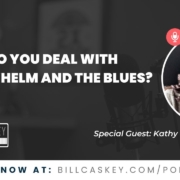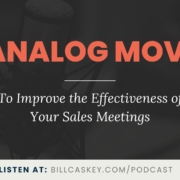Is the China Import Problem Really a Sales Problem?
[This subject is covered in depth on our podcast at http://billcaskey.podshowcreator.com/podcasts.aspx?feedid=106 It’s about 15 minutes but it applies to you who compete against ANY low price competitor – not just offshore.]
======================================================================
My friends tell me I take selling way too seriously. And that I break every problem down to a sales or communication issue. Well Bill, in Reagan’s words, “There you go again…”
I used to call on WalMart and other major retailers in a previous job, so I know how powerful their order-writing pens are. When they say to their suppliers, “JUMP” the response is usually, “YES SIR, HOW HIGH WOULD YOU LIKE ME TO JUMP?”
I can see it now…
…I can imagine a US toy company going in to sell WalMart their Christmas 2006 line of toys. After the presentation, the buyer says, “John, I like your offer. But I can get these from China for 30% less. You have to drop your price.” To which John concludes that it’s all about price (it never is, even at WalMart) and gets pulled down into the commodity conversation. He eventually can’t sell his products at a premium – so he loses the business.But as we see now, all toys are not created equally. They are not a commodity.
The problem occurred when the US toy guy couldn’t differentiate between his toys and the cheaper, lead-painted Chinese toys. My question is: Was it a selling problem?
You see, the consumer (even WalMart) does NOT just look at price. The sales organizations who don’t know how to sell any other way (except for low price) will NEVER admit that. Consequently, the admonition of “everyone buys on price” is a convenient way to prevent them from having to work on their message – or themselves. It’s a lot less effort to ‘sell cheap.’
Cheap Labor – Same Issue
I admit that cheap labor is quite enticing to businesses and customers. If I’m in the market for landscaping and I get three bids, chances are the one that uses the lowest-cost labor will probably be low bid. But is that what I’m buying? Just price?Hell, if the American consumer bought on price and price alone, they wouldn’t buy anything. Because doing nothing is ALWAYS CHEAPER than doing anything.
When will American companies understand that they offer value – that their value is tied up in things broader than price – that how they sell/market/communicate to the customer is as important – if not more so – than their price?
I’ll tell you exactly when – when they get out of their own way and start focusing on the customers – and how they can bring value to the customers – instead of how can we sell a bunch of toys? (In the world of retail there are many more important things than price – like retail profit margins, marketing campaigns for the item, store sell-through, in-store displays, etc.)
If you’re in a head-to-head combat with a low priced provider – and you get chewed up often on price – then look much deeper into your value. Get a third party assessment of the value of your solution.
Here’s What To Do
Spend time away from the office with your people – and some customers. Record every word of what they say. Have it transcribed. Study it more. And soon, you will come up with the 3-5 things that separate you from everyone else. And it won’t be price. Ask them this question: “What do you believe you give up when you decide not to do business with us?”If they say, “Nothing” then start worrying because you are nothing but a commodity.
Because if you don’t believe your value is worth 10% – 20% – 30% – 100% more than your competition (and you should) then you won’t be able to sell that value to the customer.
And they’ll buy offshore. And babies might be poisoned.




One thing that has been hammered into me by Sales training over the years is that you do not slam the competition. I’d be curious to see how, in your example, you would present your product to Walmart without attacking offshore firms (“yes Mr. Customer, we don;t poison kids with our product!”)
Good thinking – glad you brought that up. No, I agree, you would never frame something like that.
Instead you would involve them in the conversation of, “what are some of the things you would hope to avoid, regardless of who you went with on this?”
And I do mean “conversation”. Not some lame sales move that manipulates the prospect to answer your way. All of this presumes that you are detached and not needing the business…Good comment.
I think this is the most important line in your post-
“What do you believe you give up when you decide not to do business with us?”
This works in many if not ALL competitive selling environments. Allowing your prospect/client to see the value of your relationship – what do you think?
Yes, it works everywhere.Just make sure when you go through the list of what they give up (which I encourage you to do), that you don’t beat them over the head with it (metaphysically). That, instead, you have a conversation about those issues to see which ones, if any, are important to them.
Good pick up Greg!